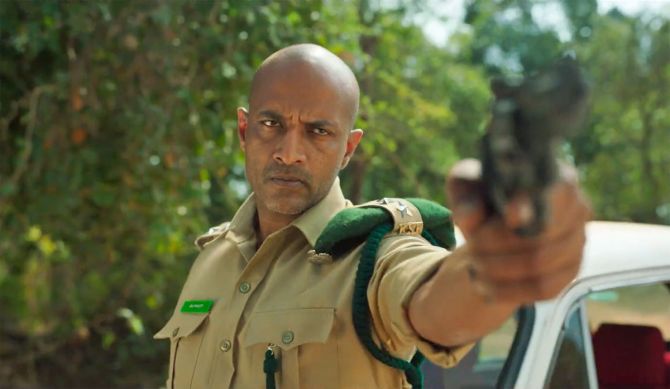Kantara is mesmerising, applauds Rajesh Karkera.

I normally steer clear of a movie for which the tagline is 'written, directed and acted by xyz'.
Well, all by the same one banda (person) because it's a just-one-cook-might-spoil-the-broth-too situation.
But Rishab Shetty's Kantara, which now has Hindi subtitles, had all enjoyable ingredients of a first-class film and never once made me rue the day I decided to watch the solo-job movie.
Here's what the movie made me realise, or rather remember: Daiva and kola are words I have heard since my childhood. Though I was born and raised in Mumbai, my family hails originally from Tulunad district, Mangaluru, and hence these are words I know of from a very long time.
I always wondered why all my elders in Mangalore are so attracted to this ritual of where a deity, not a god or deva, but a daiva is called upon for his blessings for the family or land, mostly land.
It is said in Mangalore, that, in the old days no one could sell off their land without the blessings of the daiva.
I am not a believer and this information was given to me by my wife Namita -- the daivas are essentially Lord Shiva's ganasor attendants, who were sent across the land to look after its people.
It is also said that Lord Shiva sent the ganas as he himself could not be in all the places at the same time. To please the daivas, and to remind them always that they are never forgotten, a kola is organised.
The kola is a dance ritual.
Mythological legends are recited and enacted through this medium, completely in Tulu or Kannada and drummers and artistes take part in it. The rituals go on all night and it's not just a family event, but the whole village is invited too.

Kantara reminded me of Mangalorean village kolas and it recalled stories from my childhood. Stories that my Amma (grandmother) and my aunt would tell me -- not once, but many a time, when I couldn't fall asleep.
Tales about our ancestral place, which was where the Mangalore docks are located today, in Panambur, 10 km north of the city, near a beautiful beach, and how when the New Mangalore Port Trust was coming up, the government offered land to the former residents, in compensation,in other parts of Mangalore for them to resettle.
Our home got relocated to an area named Katipalla, five kilometres from Surathkal, also north of Mangaluru and that's where I spent most of my childhood holidays.

Kantara also reminded me of the tale that went around at that time, about a big stone in Panambur.
Though the villagers were forced to leave for land the government had offered them elsewhere, this stone, which the locals worshipped, could not be moved. It was immoveable. That one stone could never be pried out of the ground.

Kantara put those bachpan tales in perspective.
A brilliant watch, Kantara is not just for the people from Tulunad, but for everyone. It's mesmerising!
It's been almost a month since its release in Kannada and on October 14 the dubbed Hindi version was released and even on a weekday evening, the theatre was packed.
The narrative begins in the early 1800s and the first few minutes of the film, till when the titles come up, is enough to tell you that this is going to be a visual extravaganza that will demand more than one look!
Kantara revolves around a village in Tulunad district and their relationship with the forest and its daivas, especially two daivas -- Panjurli and Guliga. Of the two, Panjurli is calmer and forgiving. But Guliga is the one everyone should beware of and not invoke his anger.
Rishab Shetty has done an excellent job researching and portraying this tradition of daiva adoration to those of us who are ignorant of it. He showcased what daivas symbolise in a kind of raw, earthy yet detailed, realistic manner.

This movie caters to all.
It's got laughs.
It's got superb action sequences, which do justice to Arvind Kashyap's exquisite, vibrant, cinematography.
The characters, and the village jokes at Rampa Anna's expense (Rampa Anna is a character of ridicule and the butt of jokes in Mangaluru) did tame down an otherwise scary topic, making Kantara a visual feast.
Till almost near the end, you won't know who the actual bad guy is.
But it's not a suspense movie, or a horror flick. A thriller, yes.
Yet, in a subtle way -- which also succeeds in embracing tradition -- it gives us loads of colourful entertainment that bulldozes its way into our eyes and brain.
The opening sequence offers a taste of that, when Shetty comes riding in a plough, led by bulls in a race like the traditional Kambala ones held in southern Karnataka... And THAT is all I will disclose about the film.
You want to know the storyline or see some the fantastic characters in play -- go see it soon.
This is not an everyday movie you can see at home because Kantara is made for the big screen.
You will be glued to your seat and will even wonder why the interval even happened.
Get your popcorn before the movie starts!












 © 2025
© 2025